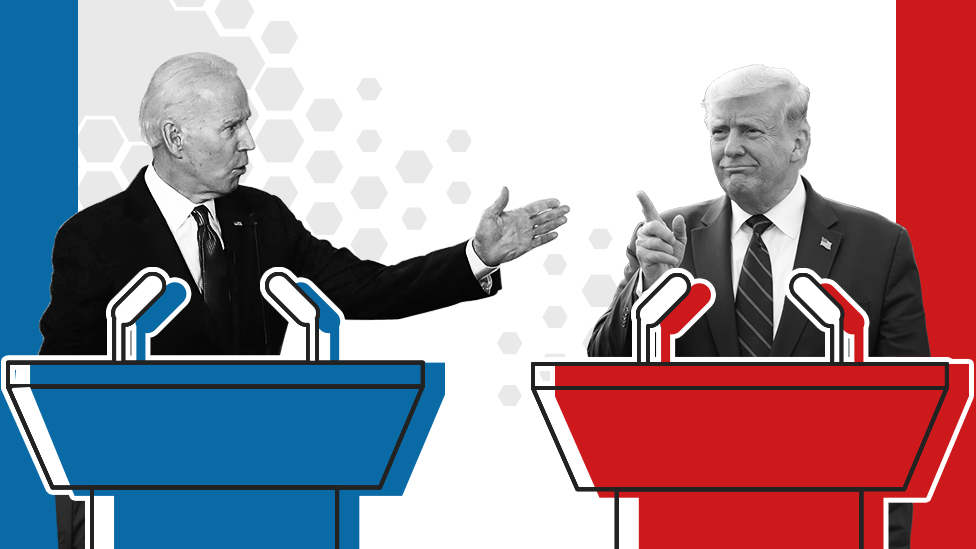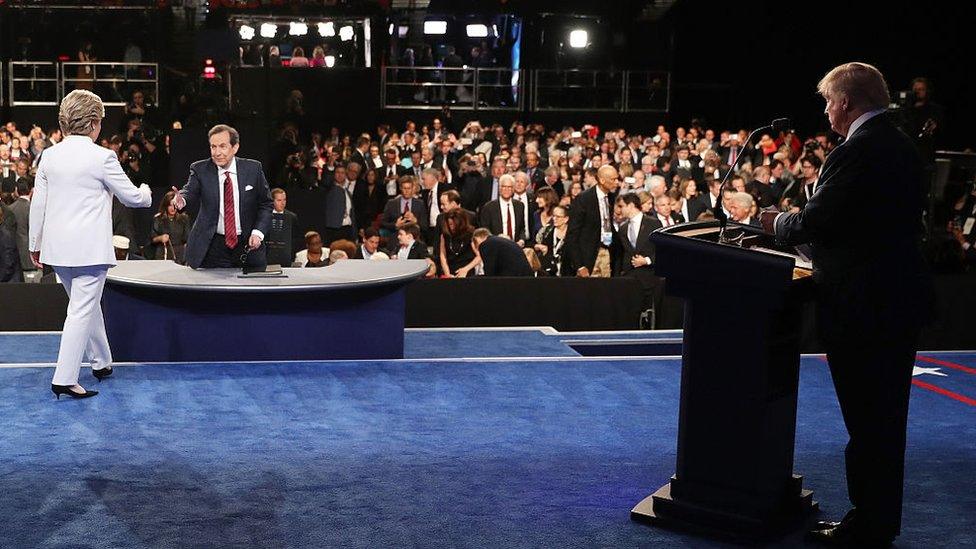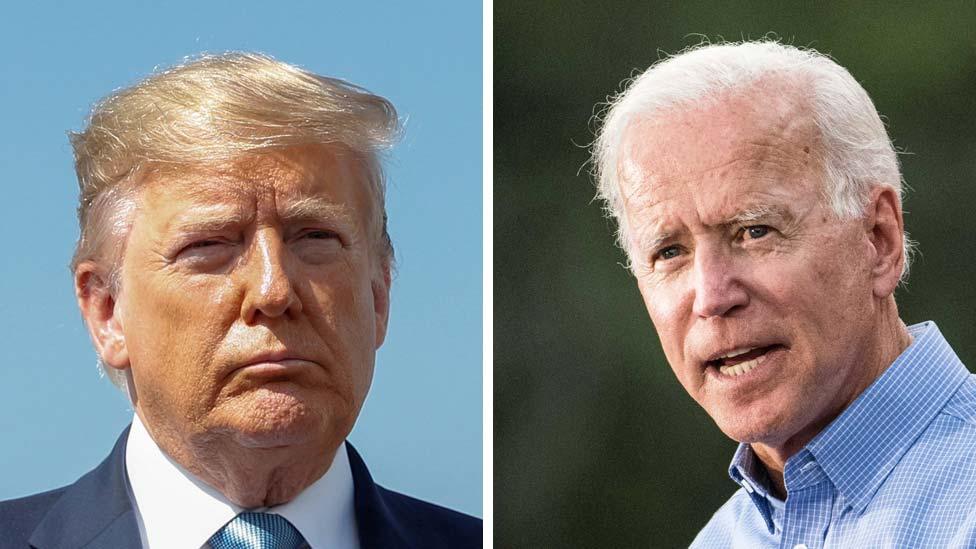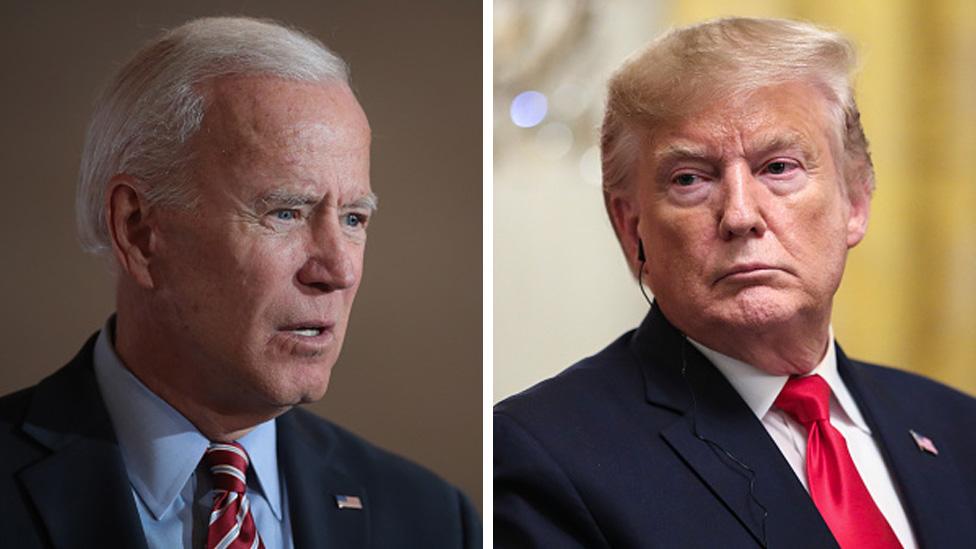US election 2020: What time is the Trump v Biden presidential debate?
- Published

We've had months of set-piece events, tightly controlled by a team of campaign staff. Well, that's about to end.
On the debate stage, candidates are on their own and in the whole campaign, this is the moment most fraught with risk.
Plenty can go wrong, so hold on tight.
Here's your handy guide.
When - and where - are the Trump v Biden debates?
There are three presidential debates on the agenda:
29 September in Cleveland, Ohio
15 October in Miami, Florida
22 October in Nashville, Tennessee
Vice-President Mike Pence and Senator Kamala Harris will also go head-to-head:
7 October in Salt Lake City, Utah
They all take place from 21:00-22:30ET (02:00-03:30BST), with no commercial interruptions.
Where can I watch the debate?
The BBC will have a livestream of all the action from the debate in Cleveland where you can also follow all the build-up on our live page here.
That's a one-stop shop for pre-debate commentary from BBC experts across the US, the debate itself and then all the reaction and analysis from our reporters and our voter panel.
All the latest developments will also be tweeted @BBCNorthAmerica, external while you can also see the main speeches and get analysis on BBC World News (global) and the BBC News Channel (UK).
What's the format for the first debate?
Six questions in six segments, 15 minutes each. The segments are:
Trump and Biden's records
Supreme Court
Coronavirus pandemic
Race protests and violence in cities
Election integrity
Economy
Mr Trump and Mr Biden will get two minutes apiece to respond to the question initially before the back-and-forth begins.
If you've got a question for the candidates, you can tell us what it is and we'll try to answer it for you. There's a form at the bottom of the page.
What should people watch out for in the first debate?

Donald Trump is a known quantity. He seeks out and dominates in the public spotlight, and his strengths and weaknesses are familiar to most Americans. That's why the presidential debates will be much more focused on how Joe Biden performs in the spotlight.
Biden's task will be to post a sure and steady performance. He needs to make Americans, at least enough of them to win in November, comfortable with the thought of him in the Oval Office. He needs to dispel concerns about his age and mental alacrity and avoid the kind of verbal stumbles that have bedevilled him in the past.
Trump's job, on the other hand, will be to trip his opponent up. As Hillary Clinton and his primary opponents can attest, he is a destabilising, unpredictable presence on the stage - and if he can fluster Biden, it might sow the seeds of doubt in the minds of the Democrat's less devoted supporters. While doing so, he will also have to be prepared for Biden's counterattacks - including criticisms about how he has handled the coronavirus pandemic, the economy and the duties of the presidency.
It has the makings of a raucous encounter.
How will Trump or Biden win the debate? Anthony assesses their strengths and weaknesses
And there could be fireworks from the moderator, right?
The first moderator is Fox News Sunday anchor Chris Wallace.
A lot of people might think a Fox News anchor would give President Trump an easy ride but this is no Sean Hannity. Quite the opposite. The president has endured some of his most awkward moments sitting across from Wallace, whose command of the detail is legendary.
An interview in July went viral when Wallace told Mr Trump he'd taken the same cognitive ability test the president touted, telling him it was "not the hardest test".
Mr Trump - who typically favours Fox News - has dismissed Wallace as a "wannabe" of his father, Mike Wallace, who was an original reporter with CBS 60 Minutes.
A registered Democrat, Wallace has said moderating debates is a serious business as it helps "millions of people decide who we're going to elect".

In 2016, Chris Wallace became the first Fox News host to moderate a presidential general election debate
For the second debate, we'll have C-Span's political editor Steve Scully moderating. That's a town hall format which means real people get to play a part too. Who could forget Ken Bone from 2016?
US Election: Internet star Ken Bone's message of hope
Finally, NBC's White House correspondent Kristen Welker will round out the debate season.
USA Today Washington Bureau Chief Susan Page will tackle the one and only vice-presidential debate.
What do supporters say is the worst thing that could happen?
We asked two voters from our panel.
Trump-supporter Mike Harlow, a 30-year-old writer/YouTuber in New York City says expectations are "so incredibly low with Biden" that he fears it'll look like a stellar performance if he "is just able to speak and stand up straight".
Biden's showing is similarly a concern for Reem Sabha, a 24-year-old graduate student in Seattle. She says she worries the Democrat's debate performance and policy plans may not translate to actual votes.
"I'm concerned people will say Joe Biden doesn't have the energy to be president or he's too old to be president or he doesn't have the character or the gravitas."
But when have debates actually affected an election?
Viewership has been on the decline, external, but millions of Americans still regularly tune in.
It's both entertainment and informative - for many voters the debates help cement their candidate of choice.
The first ever televised debate in 1960 pitted young Democratic Senator John F Kennedy against the sitting vice-president, Republican Richard Nixon.
Mr Kennedy's team made sure he looked fresh for the close-ups, while Mr Nixon, who was recovering from an illness, donned an ill-fitting suit and was seen wiping sweat off his brow. The story goes that most of the 70 million TV viewers felt the youthful Mr Kennedy had won, while those who tuned in solely on radio thought it was the more experienced Mr Nixon.
Mr Kennedy did see a jump in the polls after the debates, even though we can't say for certain it was due to his small screen prowess.
Republican challenger Ronald Reagan defeated President Jimmy Carter in their 1980 debate by keeping things short and sweet.
Where Mr Carter tried to highlight policy and history, Mr Reagan used one-liners to his advantage. He responded to one of Mr Carter's lengthy criticisms by saying simply: "There you go again."
In 2000, Democratic candidate Al Gore's debate performance against George Bush may have cost him the presidency. His sighing and eye-rolling during his Republican counterpart's responses came across as condescending to many voters (and made it into a Saturday Night Live comedy skit).
What would you ask the candidates?
If you were a debate moderator, what would you want to ask Mr Trump and Mr Biden?
Send us your questions using the form below. If you can't see the form, you may need to view the site on a desktop.
In some cases, your question will be published, displaying your name, age and location as you provide it, unless you state otherwise. Your contact details will never be published. Please ensure you have read our terms & conditions and privacy policy.
- Published27 August 2020

- Published27 July 2020
